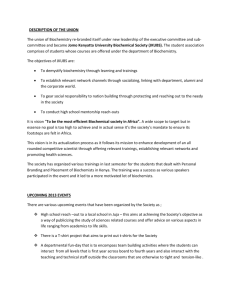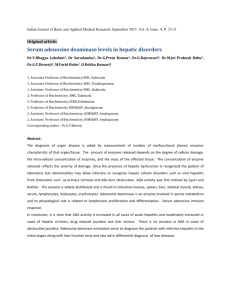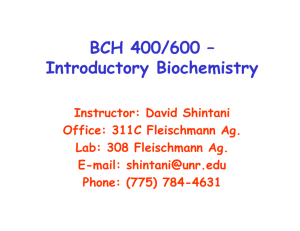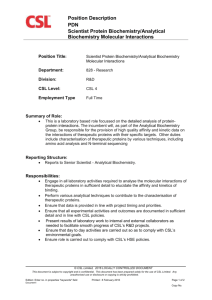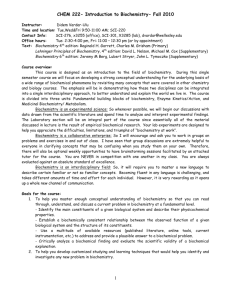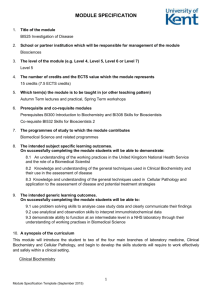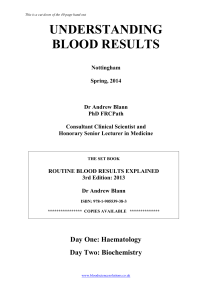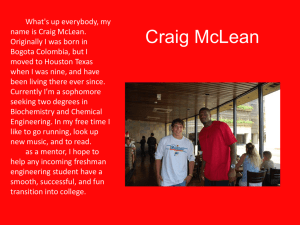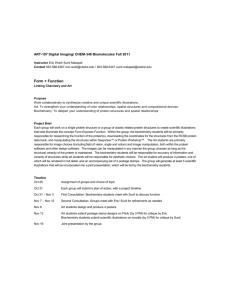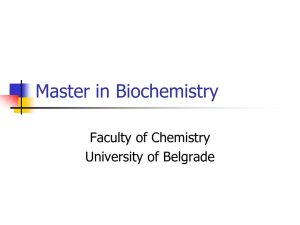第一章 绪论
advertisement
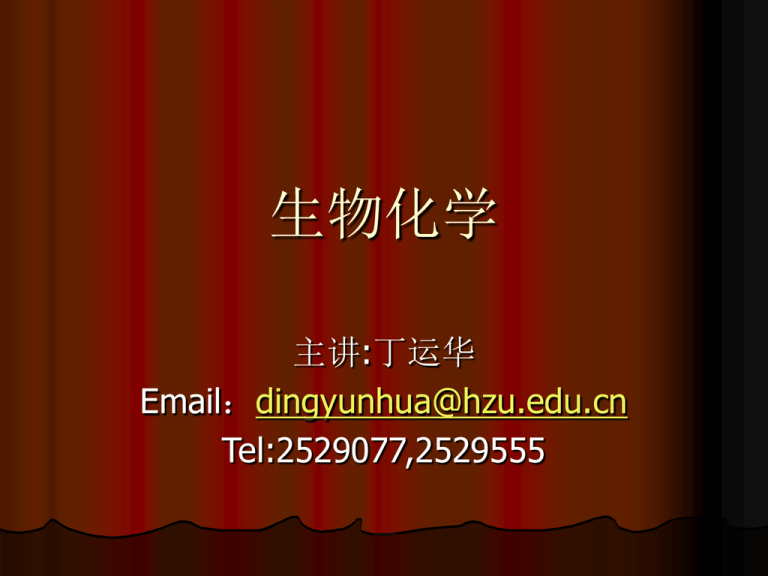
生物化学 主讲:丁运华 Email:dingyunhua@hzu.edu.cn Tel:2529077,2529555 Charpter 1 introduction §1,definition and contents 1、definition Chemistry of life, 2、contents 1,chemical composition 2,chemical change, metabolism 3,storage ,transfer and expression of genetic material 4,relation between composition and change (mechanism of life) Let's illustrate by example. The fermentation process by which sugar from cellulosic plant wastes is chemically changed into alcohol underlies the production of gasohol. Yet the fermentation of sugars in fruit juice is one of the oldest cottage industries, having been practiced long before the word "biochemistry" ever existed. The origins of biochemistry lie in the study of these fermentation processes. Louis Pasteur discovered that transformation of sugar to alcohol is caused by a living organism, yeast. Eduard Buchner later expanded upon that conclusion by grinding up yeast cells and extracting a water-soluble, cell-free "juice" that could ferment sugar to alcohol in the absence of living cells. Pasteur had done a biology experiment. He showed that fermentation was a life process that occurred in a living organism. Buchner had done a biochemistry experiment. He showed that living cells could be taken apart. A mixture of dissolved substances, lifeless molecules, could still carry out the "life process" of fermentation. 5,biochemical technology : Chromatograph, spectrophotography, ultracentrifuge, dialysis, separation, purification, identification: trace, rapid, simple, automatic, Buchner, by taking apart yeast cells, had opened the way to ask biochemical questions like: What kinds of molecules cause fermentation? How many different molecules are necessary? Why does the yeast cell do it? Why does it only happen if you keep oxygen out? These are questions that can be answered by separating the "dissolved substances" in the "juice" and asking what they are, how they interact with each other, and how their properties are related to their chemical nature. §2:history and current situation At the end of 19 century, became individual science, 1950s,rapid development “molecule cap ” to many disciplines。 Basic language and basic method Make Research area expanding Sounds exciting! Milestones 1864,German Dr. Hoppe Seyler purified the 1st protein: Hb, 1902,German Emil Fischer testify protein is peptide 1926,America Summer purified the 1st enzyme,1946 Nobel Prize 1926,German Windaus, Vitamin D,1946 Nobel Prize 1930,German Warburg, cell respiration,1931 Nobel Prize 1937,UK, Krebs, TCAC,1953Nobel Prize 1940, US, Beadle &Tatum, one gene one enzyme, 1958 Nobel Prize 1946,US, Lederberg & Tatum,DNA recombination,1958 Nobel Prize 1947,US,Lipman ,HsCoA,1953 N.P 1948, US,Pauling,α-helix,1952β-sheet, sickle cell ,1954 N.P 1953,UK, Sanger, primary structure of insulin ,1958N.P 1953 , US,Watson,UK Crick, DNA double helix, 1962N.P 1955, US,Ochoa ,Polynucleotide phosphorylase, make RNA,1959N.P 1956,US, Kornberg ,DNA polymerase, make DNA,1959N.P 1960, UK,Kendrew & Perutz, 3dimensional structure of myoglobin, 1962N.P 1961,French, Jacob & Monod, operon theory,1965N.P 1965,PRC, make the 1st protein insulin A meticulous job! 邹承鲁 邢其毅 钮经义 汪 猷 龚岳亭 杜雨苍 1969,US,Nirenberg ,Decode genetic code, 1969N.P 1970,US, Temin,Reversed transcriptase,1975N.P 1971,US,Khorara,make gene ,1975N.P 1972,US, Berg ,DNA recombinant technology,1981N.P 1975年,英国 Sanger 建立DNA一级结构测 定方法,获81年诺贝尔奖 1976年,美国 Mexam和 Gilbert 建立测定 DNA一级结构测定的化学方法。获81年诺 贝尔奖 1978年,日本板仓将人生长素基因在E.coli 质体上表达成功 1979年,美国基因技术公司用人工合成的 胰岛素基因在E. coli中表达成功 1981,PRC, 酵母丙氨酸tRNA的合成 1983,美国 罗伯森建立基因诊断方法 1984年,美国穆利斯发明PCR技术,可以 在几十分钟内将一个DNA分子扩增成100万 个,这项工作使得人类基因组测序工作变 得可能。获93年诺贝尔奖。 1989年,美国Cech发现酶也可以是RNA, 获诺贝尔奖 §3,history of biochemistry in PRC Appear in 1920s。 First in medical college, 1924,吴宪began research in Beijing。 Followed by agriculture college, Institute began enrolling graduate students Before 1949,research focused on blood and nutrients analysis 吴宪modified blood sugar determination method 吴宪began research on denaturation of protein in 1924, papers published by Advances in Protein Chemistry, rare in academic world at that time. 吴宪在协和医学院建立和主持生物化学科 18年,培养了大批高质量的毕业生,接收 进修生和研究生约20人,吸收刚回国的青 年化学家到他的实验室工作,先后达10余 人。这些人都成为国家栋梁之材,为发展 我国生物化学或其他化学学科做出了贡献。 吴宪在1949年以前无愧于是我国生物化学 的奠基人。 1949年后,生物化学教学国内高校全面展 开。,重点综合性大学(如北大、南大、 复旦)相继开设生物化学专业,中科院成 立生化所。 王应睐是1949年后把生物化学作为独立的 学科建立起来的重要奠基人。实验室工作, 培养人才,组织队伍,制定规划。 50年代,核酸DNA双螺旋结构的发现,蛋白 质晶体衍射的进展,国际上生物化学和分 子生物学研究处于一个大飞跃时期。 国内各方面的基础十分薄弱,人才少,仪 器设备十分缺乏、落后。 王应睐争取一批在国外工作的学者回国, 以他们为骨干,逐步培养一支我国自己的 生物化学专业队伍 1951~1952年,邹承鲁、曹天钦、王德宝 相继回国,分别在上海生理生化所开展酶 化学、蛋白质和核酸的研究工作。 纽经义、周光宇也陆续到上海生理生化所 工作。 上海生理生化所逐渐形成了一个包括酶、 蛋白质、核酸、代谢等方面的研究体系, 并培养了一批年轻专家。 1958年中科院上海生物化学研究所成立, 王应睐任所长。从此,生物化学获得了长 足的发展。 1965年和1981年,生物化学家和有机化学 家合作,在世界上首次人工合成结晶牛胰 岛素和酵母丙氨酸转移核糖核酸(王应睐 分别担任这两个协作组的组长),使中国 人工合成生物大分子的水平保持世界领先 地位,受到了国际同行的高度评价。 近10年来,大批中青年科学家国外进修后 回国工作。国内重点院校和科研院所均设 立生物化学与分子生物学的硕士和博士点, 培养了一大批国内的研究力量 建立了相当数量的国家重点实验室和部门 开放实验室,涉及生物化学与分子生物学 领域这类实验室已有10多所。 §3:application agriculture industry Animal husbandary Medicine nutrition Why should I learn this? §4 teaching arrangement Difficulty and complexity Limits of time,learning goals Total units 102,theory 72,lab30,1 term Exam and grades: homework+quiz+lab+final exam Textbooks and references 生物化学简明教程(第三版),1999年6 月,高等教育出版社,聂剑初等合编,罗 纪盛等修订。 生物化学(第二版),1990年12月,高等 教育出版社,沈同,王镜岩主编。 普通生物化学(第三版),1998年7月, 高等教育出版社,郑集,陈钧辉编 生物化学原理,2003年9月,高等教育出 版社,张楚富主编。 生物化学(第二版),1999年2月,北京医科大学出版社, 张迺蘅编 BIOCHEMISTRY: AN INTRODUCTION(second edition), 1999 by the McGRAW-Hill Companies,Inc.,Trudy Mckee,James R. Mckee 应用生物化学,2001年12月,化学工业出版社,欧伶等主 编。 生物化学,2001年1月,化学工业出版社,张洪渊,万海清 主编。 Instant Notes in Biochemistry,1997,BIOS Scientific Publishers Limited,B.D.Hames, N.M.Hooper and J.D.Houghton. 现代生物化学,2001年9月,化学工业出版社,于自然,黄 熙泰主编。 生物化学,1993年8月,中国中医药出版社,段金生主编。 生物化学,1994年7月,上海科学技术出版社,周梦圣主编 Biochemistry By: Sarah Frye and Jeremy Peacock What Is Biochemistry? Biochemistry studies living systems to discover and understand how organisms carry out life processes. Combines biology and organic, inorganic or physical chemistry to study life processes. What Do Biochemists Do? Biochemistry is used in many fields, medicine, physiology , toxicology. pharmacology food and agricultural sciences, Where Do Biochemists Work? Colleges, Universities and Government agencies employ the majority of biochemists. Drug companies Biotechnology companies Hospitals Personal Characteristics Curious about chemical origins of life. Creative, imaginative, and hardworking. Enjoy working in a laboratory setting with other researchers. Cooperative-must work well in a group. Need to have good speaking and writing skills. Job Outlook Job outlook is good. Industry is expanding, especially in the field of genetics. Salaries B.S. (Bachelor of Science)– range from $30 - $40 thousand. M.S. – approx. $45 thousand. PhD(Doctor of Phylosophy) – approx. $65 thousand. Education and Training B.S. in biochemistry or chemistry. Specialization in biology, genetics, molecular biology, biophysics, and biochemical methods. Biochemistry course and lab work. For teaching, must have at least a masters, preferably a PhD. Five Helpful Websites 1. http://chemistry.org – type in biochemistry in search field. 2. http://www-afa.adm.ohio-state.edu/umajors/pdf/biochem.pdf 3. http://career.bio.com 4. http://www.biochem.purdue.edu/undergrad/whatis.html 5. http://www.asbmb.org

